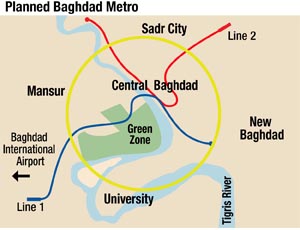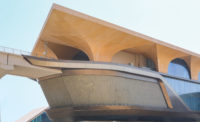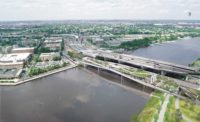Through three wars, plans for an underground metro in Iraq’s capital city languished in a “pending” file. Now Baghdad municipally has signed a contract with a French firm and is dusting off decades-old designs for a 40-kilometer system.

The government also aspires to develop a separate plan for a 25-km elevated transit project as well.
French design firm Systra S.A., Paris, now is mobilizing for 18 months’ work to develop the two-line metro project sufficiently for the city to solicit an engineer-procure-and-construct contract. Under Systra’s agreement, signed May 27, Systra also will advise on procurement.
Systra was among eight European, American and Middle Eastern firms shortlisted to bid in late 2009.
Also in the works, Paris-based Alstom Transport is negotiating a potential turnkey contract to develop an elevated rail system linking the northern district of Al-Mustansirya with Al-Alawi in central Baghdad. Baghdad officials signed a memorandum of understanding with the French firm for the 15-station project this January, confirms an Alstom spokeswoman.
So far, both projects appear to be evolving independently of one another. However, engineers at Systra expect to review how the two systems could interact during their study. The company bid for its metro contract without having seen designs prepared by a team of British consultants, led by Halcrow Group, London. That project was shelved during the 1980 to 1988 war with Iran.
The current iteration of the metro project includes two intersecting metro lines that will extend for 18-km and 22-km, respectively. Level and alignment of the underground system has been defined by the earlier study, says a Systra executive, asking not to be named. Earth-pressure-balance tunnel boring machines likely will be needed to cope with the wet alluvium covering much of the route, he adds.
Other construction challenges include a crossing of the River Tigris, largely uncharted utilities, a preponderance of archaeological remains and the still-uncertain security. To reduce risks to some 20 staff assigned to the project, much of the work will be done in Paris, says the executive.




Post a comment to this article
Report Abusive Comment